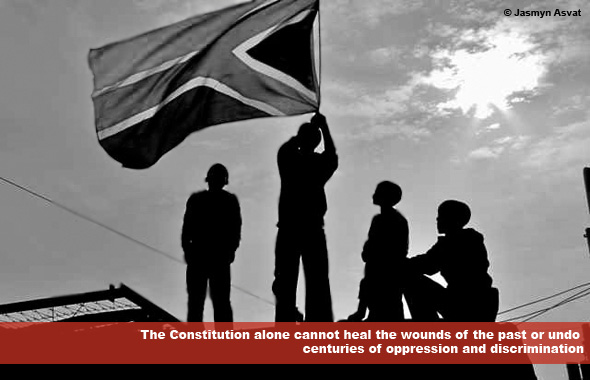South Africa at 30: Navigating the legacy of policy versus lived realities
Posted: 10 June, 2024 Filed under: Naledi Joyi | Tags: apartheid, coalition government, community development, democracy, democratic principles, economic empowerment, education, equality, freedom, historical injustices, human rights violations, justice, pit toilets, serious crimes, socio-economic challenges, South Africa, structural inequalities, sustainable peace, violence 1 Comment Author: Naledi Joyi
Author: Naledi Joyi
Gender Officer, Centre for the Study of Violence and Reconciliation
After three decades of democracy, South Africa stands at a crossroads grappling with the interplay between policy aspirations and lived realities of the majority of the black population. The country boasts one of the most progressive constitutions globally because it is based on equality, freedom and justice. Yet the lived realities of its citizens leave one asking ‘what good is a constitution if it cannot be implemented?’. Although policies to address historical injustices and structural inequalities have been developed, implementation has been a challenge leaving many of the previously disadvantaged populations still disadvantaged, resulting in the country being dubbed the most unequal society in the world, with the rich getting richer and poor getting poorer. The country’s identity is closely linked with violence, entrenched in the legacy of apartheid, which used violence as a method of control.
As we reflect on three decades of freedom it is crucial to understand why progress in attaining equality in South Africa has been hindered. Multiple intersecting factors contribute to this challenge, including the historical legacy of apartheid, violence, structural injustices and lack of political will from the ruling elite. While the constitution has achieved formal equality, it is important to look at the context in which implementation will take place. As it stands the Constitution is a useful framework for preserving human rights and protecting all citizens, but it cannot single-handedly deal with the deeply entrenched socio-economic inequalities engineered by Apartheid. The Constitution alone cannot heal the wounds of the past or undo centuries of oppression and discrimination. However, it does provide a foundation upon which progressive policies and interventions can be built to promote equality and social justice.

Race continues to operate as a proxy for culture and relative advantage in South Africa, despite efforts to move towards a non-racial society. This reflects the enduring legacy of apartheid and the continued persistence of racialised inequalities in society. The legacy of racial discrimination and segregation persists in many aspects of daily life as illustrated by the high rates of inequality, and high concentration of lack of access to infrastructure that contributes to social development. The fight to access education is an example of racial segregation. In January 2024, videos circulated which showed school children crossing rivers to try to get to school. The struggle of the youth for education is further illustrated by the 2015 fees must fall protests and the 1976 student protests against Bantu education. The high rates of inequality and poverty highlight the failure of the state to bridge the gap of nation-building and ensure a safe and peaceful society.
Consequently, the high rates of GBV in the country emphasise the persistence of social injustices and human rights violations in South African society. Sites of serious crimes and violence are places where black South Africans reside. Moreover, we should critically examine the narratives we engage in and the implications of blackness being equated to violence. Shifting the narrative involves acknowledging the complexity of structural violence, which is often rooted in systemic inequalities and historical injustices. Structural violence manifests in various forms, such as economic marginalization, lack of access to quality education and healthcare, and social exclusion, disproportionately affecting marginalized communities. Moving forward requires a multidisciplinary approach that addresses the root causes and symptoms of violence while empowering society with resources promoting sustainable development. Meaningful investment in education, economic empowerment, community development, and social services can help to address the structural inequalities that contribute to violence in communities.
The state’s commitment to safeguard the rights of its citizens to bring about equity and promote sustainable peace is a dream denied for many in South Africa because access to social services is a luxury kept for those who can afford it. A case study conducted by the Centre for the Study of Violence and Reconciliation in Lusikisiki found that the contextual enablers of rape in the community also include state response to the violation. First in line is the police response which discourages the victim and often blame her for the occurrence. This prevents many victims/survivors from seeking justice which violates their right to safety.
In the Eastern Cape school children are drowning in pit toilets while at school because they have no access to proper sanitation, which is a violation of their right to education and hinders development. Additionally, the country has had drastic occurrences that have changed the daily lives of citizens and residents. For instance, floods in KZN and Eastern Cape left many families without housing, access to food, and resulted in a dip in job security, highlighting the complex vulnerabilities that are historically entrenched to populations in non-white environments. In July of 2023, one of the busy streets of Johannesburg exploded, which left that part of the city in the dark for an approximation of 7 days. Residents and those working in the central business district experienced a trauma that they continue to face as the street is still under construction. The state’s response to disasters is not enough and the mental health impacts of such disasters also need to be addressed as they may contribute to the rise of violence.
The youth should be beneficiaries of democracy and should be contributing to the democratic state of their country. However, the youth in South Africa remain vulnerable in the labour market with 4,6 million unemployed youth and a total of 6,0 million employed according to StatSA. Thus, while this picture is not all gloomy as there are opportunities for some youth, the argument is that the benefits of democracy should be a norm all across and not a privilege for a select few.
These challenges undermine the legitimacy of the democratic system and erode public trust in the government and its institutions. The triple threat of poverty, inequality and unemployment are immediate issues that communities are worried about and therefore being brought food solves the immediate problem of hunger but does not address anything else. The lack of education and training then works in the favour of political parties because communities do not ask the critical questions that call any political party into account.
As we look ahead as a country, we must confront these challenges with renewed vigour and commitment to the Constitution’s principles. Strengthening institutions, enhancing accountability, and fostering inclusive growth are imperative for advancing the promise of democracy. It’s a journey that requires collective engagement and a steadfast dedication to realizing the aspirations of all South Africans. As the nation marks three decades of democracy, let it be a moment not only for reflection but also for recommitment to the ideals that inspired its historic transformation. Ultimately, the preservation of South Africa’s democracy depends on a collective commitment to upholding democratic principles and values, even in the face of challenges and setbacks. Citizens, civil society organizations, and political leaders must work together to defend the democratic institutions and freedoms that are essential for the country’s continued progress and prosperity.
Not all hope is lost yet. Looking at the 2024 electoral results, South African citizens have called to action the political leaders to work together for the benefit of the country. A coalition government presents several opportunities for the future of the country, including increased accountability, policy reform and innovation, strengthened democracy, civic engagement, and economic growth and development. These opportunities can help reinvigorate democratic principles and address pressing socio-economic challenges through collaborative efforts.
About the Author:
Naledi Joyi currently occupies the position of Gender Officer at Centre for the Study of Violence and Reconciliation.

[…] This article was originally published by AfricLaw […]